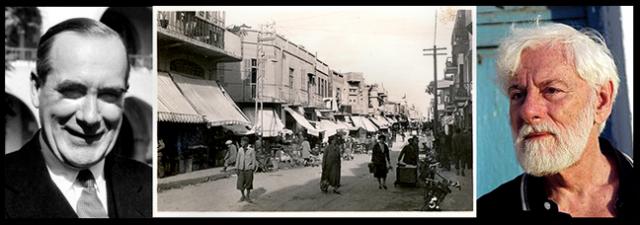Two veteran friends of mine will be on one of the ships planning to leave Athens next week to challenge the Israeli sea blockade of Gaza. The Israeli government, after attacking a previous flotilla in May 2010 and killing nine people, has said it will use violence if necessary to prevent the ships from entering what any reasonable person by now should agree are Palestinian waters.
This confrontation should not be necessary. The Israeli military occupation over Palestinian life should have been eased and sovereign rights established for Palestinians long ago. The crisis of Palestinian status has reached the level of a disaster, and like the creation of Israel itself it is more than a Jewish problem: It is a world problem.
The flotilla as an act of civil disobedience is occurring at a time Israel/Palestine peace talks are dead in the water and the fledgling coalition of Fatah and Hamas is planning in September to seek recognition of Palestine as a sovereign state from the UN General Assembly, the very same body that recognized Israel in 1947. The US doesn’t want this to happen because, if the past is a guide, it will feel it has to reject the Palestinian request. Since the US is only one of many equal votes in the General Assembly — versus the Security Council where its veto rules — a US vote supporting Israeli intransigence will do nothing but be galling for much of the world.
 Israeli Foreign Minister Avigdor Lieberman, left, and Prime Minister Benjamin Netanyahu
Israeli Foreign Minister Avigdor Lieberman, left, and Prime Minister Benjamin Netanyahu
At a time when people in the Middle East and North Africa are in the streets seeking new governing relationships and United States citizens of both parties are becoming fed up with foreign wars, the Israeli government of Benjamin Netanyahu and Avigdor Lieberman is acting like a dangerous, petulant child covering its eyes to make the real world go away.
Why does this matter? Why should ordinary Americans care about this? Why not just let the Israelis continue along the same belligerent path they have established over the past decades? The reason is simple: What Israel does or doesn’t do affects our lives here in the United States. Our tax dollars finance their military. And, most important, tiny Israel can drag this huge nation into a major world conflagration it does not want.
The Historic Path to a “Jewish State”
According to the Israeli writer Uri Avnery, the real problem is “all this nonsense about recognizing Israel as the ‘Jewish state.’ It serves many different purposes, almost all of them malign.” In a recent essay he compared Israel, as a religious state, to The Islamic Republic of Pakistan, which like Israel, was created 60 plus years ago out of a volatile ethnic conflict.
Avnery’s family arrived in Israel from Europe in 1923 and soon fell into extreme poverty. He fought with the Irgun against the British, but, then, left in protest of the Irgun’s anti-Arab, terrorist tactics. He was severely wounded fighting in the 1948 war and wrote a famous book about it. He served multiple terms as a member of the Knesset and was once the focus of Golda Meir who said: “I am ready to mount the barricades in order to get Avnery out of the Knesset!” Once he left the Knesset, he became a journalist and has been part of the Israeli left and peace movement for many years. While the Israeli peace movement has been effectively marginalized by the party of fear and conquest, Avnery has not abandoned the notion that Arabs and Jews can get along.
Comparing Israel and Pakistan as like religious states with atomic weapons is, of course, a harsh analogy for many to absorb. I imagine Avnery’s intention is to shock as a way to shake things up and empower a reasonable, radical alternative to the current rightist, Iron Wall policies — to avoid a terrible future for Israel and its patron, the United States of America.
In his 1964 memoir, A Start In Freedom, Sir Hugh Foot, a British colonial administrator in Palestine during a period of Arab rebellion in the 1930s, tells how the current Israel/Palestine impasse was set in motion by the British with the help of the United States. Here’s how Foot describes the roots of the current tragedy:
“The failure of the British administration in Palestine was inevitable. The double sin had been committed of raising false hopes both with the Arabs and with Jews. The hopes were false because they were conflicting. The Arabs who fought with Great Britain in the first world war to throw off the yoke of the Turkish Empire were led to believe that they were fighting for their freedom. The Jews were led to believe by the Balfour Declaration in 1917 that they would win a national home for the Jewish people in Palestine. …The United States particularly urged us on in the pursuit of policies which were bound to lead to conflict.”
He goes on to emphasize, “The Balfour Declaration promised support for a Jewish national home in Palestine.” It said nothing about a strictly Jewish “state.” Avnery points out how, 30 years after Balfour, the English translation of the 1947 Israeli “Declaration of Independence” was “blatantly falsified” to emphasize statehood, while it does not use that term in the original Hebrew. It’s the difference between a secure “home” based on diplomatic understandings and a “state” based on domination and military control.
 Sir Hugh Foot, left, a British soldier's photo from Palestine in the 1930s, and Uri Avnery
Sir Hugh Foot, left, a British soldier's photo from Palestine in the 1930s, and Uri Avnery
The point both Foot in 1964 and Avnery today are making is that the historic roots of the Israeli state were a formula for disaster – and that disaster is now unfolding before the world’s eyes. “[B]y the fundamental dishonesty of our original double dealing we had made disaster certain,” writes Foot. “In the narrow compass of the Holy Land we had unleashed two hopes, two forces, two nationalisms.”
Of course, once “unleashed” by the imperial powers, the internal power and momentum of the “two nationalisms” took over with mutual righteous fervor, both feeling ownership of the same land. The fact, as Foot points out, “Palestine was populated and owned by Arabs” was a matter of facts-on-the-ground that the intense drive of Zionism by the late 1960s had turned on its head with the use of superior military power.
Avnery says it was the European holocaust “with its huge emotional impact” that sealed the deal for disaster. Add the imperial strategic partnership with a United States in decline, and the current impasse becomes a nightmare.
Foot, Avnery and others equally as credible raise serious, radical questions based on a reading of history that too easily gets lost in the reactionary defensiveness of Israelis like Netanyahu and Lieberman and their knee-jerk supporters in the United States. These honorable radicals are saying a workable solution to the Israel/Palestine impasse is not in the 1967 borders President Obama has cited; it is even farther back in recognizing the “failure” and “original double dealing” that “made disaster certain” and, then, diplomatically accommodating for those failures in contemporary peace talks.
The hurdle, of course, is humility, which is in short supply these days on both sides.
Radicalism and Extremism
If Foot and Avnery are correct, the British Empire and the one that succeeded it in Washington DC bear very real responsibility for the current Israel/Palestine impasse. The whole mess is built on conflicting promises and the fact one side of the impasse has vastly superior weapons and the other side has a vastly greater, regional population, a population now in wide and unpredictable upheaval.
As Avnery emphasizes with the Pakistan analogy, religion has only exacerbated the problems. In a book that covers the sins of all religions, When Religions Become Evil, Charles Kimball cites the settlement movement in the West Bank as a major cause of the impasse. “The uncompromising biblical claim for all the land and the powerful political role played by Jewish extremists,” he writes, “are like a lighted match in a room full of high explosives.”
Defenders of Israel will, here, cite all the sins of Muslim extremists, and they are right. The same metaphor of lighting a match in a room full of explosives works for them, too. But the tit-for-tat response doesn’t let Israel off the hook, as it misses the point that Israel needs to find the courage and the humility to examine its history and find a new way, a synthesis of the past and the present. At the same time, we in the United States need to stop feeding Israel carrots and whacking Palestinians with a stick.
The word “radical” has gotten a bad name. It comes from the Middle English word for root. While radical can often mean top-to-bottom, thorough change – a complete “makeover,” if you will — it can also mean the courageous employment of a reasoned and fair reading of history as a guide for change. Too often being a radical is synonymous with being an extremist, which are two completely different ideas. Actually, extremist change is often a virtually guaranteed outcome when necessary radical change is not permitted.
The two Veterans For Peace members I know who will be part of the second flotilla were both Colonels. After 29 years of military service, including service in Afghanistan, Army Colonel Ann Wright followed her powerful moral compass and decided to devote her life to peacemaking; she was on the first flotilla. Marine Colonel Ken Mayers is a Jew with 21 of his mother’s extended family lost in the holocaust; for him, it’s a matter of saying “never again” to one people persecuting another. In a You Tube, he says he is going as “an act of atonement.”
